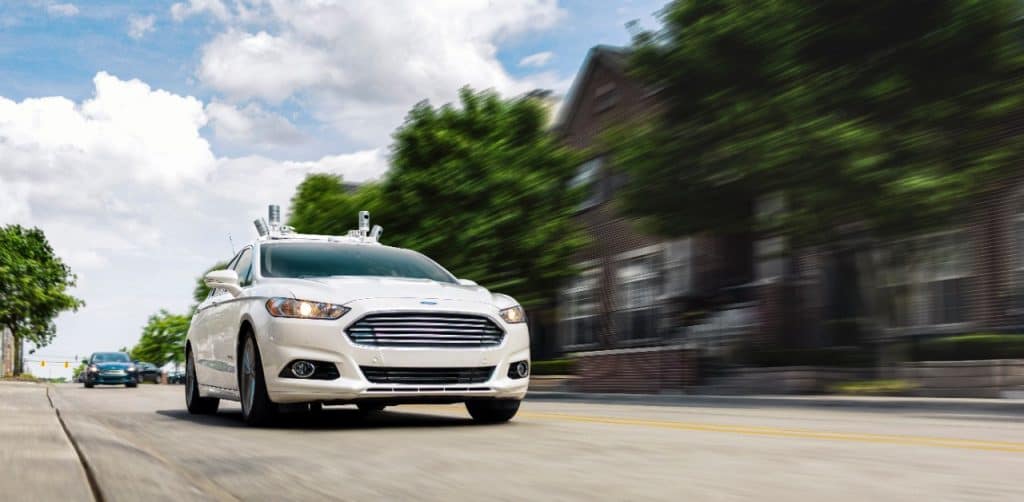 What car is leading the race for the self-driving car? New research suggests that Ford not Waymo, Apple or Uber is the leader in self-driving cars, reports Navigant Research. When rated by strategy and execution, Ford is the leading company developing automated driving systems, followed by General Motors, the Renault-Nissan Alliance, and Daimler.
What car is leading the race for the self-driving car? New research suggests that Ford not Waymo, Apple or Uber is the leader in self-driving cars, reports Navigant Research. When rated by strategy and execution, Ford is the leading company developing automated driving systems, followed by General Motors, the Renault-Nissan Alliance, and Daimler.
Ford’s CEO, Mark Fields is frequently seen at tech trade shows and making announcements during CES. At CES 2017, Ford announced that it is tripling its fleet of Fusion Hybrid autonomous research vehicles this year – making the company’s fully autonomous vehicle fleet the largest of all automakers.
This is interesting because number two in the lead, GM just announced that it will add more than 1,100 new jobs and invest $14 million in a new research and development facility for Cruise Automation in San Francisco. Cruise Automation and GM engineers are currently testing more than 50 Chevrolet Bolt EVs with self-driving technology on public roads in San Francisco; Scottsdale, Arizona; and metro Detroit.
At CES, Nissan noted the next Nissan LEAF will have a semi-autonomous mode using ProPILOT technology, enabling autonomous drive functionality for single-lane highway driving.
Mercedes-Benz and NVIDIA announced a partnership to bring an NVIDIA AI-powered car to market at CES, also.
Meanwhile, Intel takes that the “let’s work together approach”. Intel’s Lead Autonomous Engineer blogged that estimated amount of data that an autonomous car will generate in about an hour and a half of driving if four terabytes which is a lot of data to deal with.
” At Intel, we believe the best way to solve the autonomous driving data challenge is to do it collectively, to work together across the industry to develop secure state-of-the-art platforms and to share safety-related information. As we work toward a shared vision of a world without accidents and with mobility for all, industry collaboration will accelerate our ability to deliver. I am thrilled to be working with our Intel team and key partners on the 4TB challenge, as I know that solving this problem will lead to safer roads and a better journey for all.”
Plus, Intel bought a big supplier of self-driving tech Mobileye.
Navigant Research believes that automated driving is a key technology for improving the commuting experience while also addressing the societal problems caused by the saturation of automobiles, including traffic congestion, injuries and fatalities, as well as diminished air quality. Advances in computational architectures and sensing technology are driving the market forward, and when coupled with dramatic cost reductions, vehicle electrification, and ubiquitous connectivity, highly automated vehicles are quickly nearing a level of maturity that will enable initial deployments for consumers.
“Tremendous progress has been made in just the last few years on the development of automated driving systems. However, as we get closer to deploying high-level automated driving, everyone involved must now address the remaining questions that are in many ways more difficult to answer than developing the foundational technologies,” says Sam Abuelsamid, senior research analyst at Navigant Research. “The companies that have the resources and expertise to ensure that the automation technologies are robust enough to operate in a broad range of conditions while also supporting business models that bring access to the masses are the most likely to succeed.”
Stakeholders competing in this space include OEMs, suppliers, non-automotive technology companies, and startups. According to the report, companies that control the entire automated driving stack, including hardware, software, and services, will have a significant advantage as the automated driving market matures. Additionally, market players with existing vehicle manufacturing capabilities or partnerships with manufacturers are expected to have an edge on the competition.
The report, Navigant Research Leaderboard Report: Automated Driving, examines 18 leading companies developing automated driving systems and rates them on 10 criteria: vision; go-to market strategy; partners; production strategy; technology; sales, marketing, and distribution; product capability; product quality and reliability; product portfolio; and staying power.
Navigant Research’s proprietary Leaderboard methodology rattes ranks companies with the goal of providing an objective assessment of their relative strengths and weaknesses in the global market for automated driving systems.
Athough there are many companies trying to make self-driving safe they don’t want to take responsiblity. The Safe Autonomous Vehicles (SAVe) Campaign announced that out of more than a dozen automakers it challenged to take responsibility for failures in their autonomous vehicle technology, only Volvo has publicly agreed to accept responsibility for their robot cars at some levels of automation.